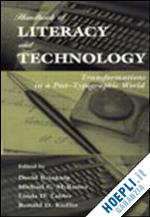Contents: D. Reinking, Introduction: Synthesizing Technological Transformations of Literacy in a Post-Typographic World. Part I:Transforming Text. J.D. Bolter, Hypertext and the Question of Visual Literacy. L. Anderson-Inman, M.A. Horney, Transforming Text for At-Risk Readers. M.C. McKenna, Electronic Texts and the Transformation of Beginning Reading. Part II:Transforming Readers and Writers. J. Myers, R. Hammett, A.M. McKillop, Opportunities for Critical Literacy and Pedagogy in Student-Authored Hypermedia. L.D. Labbo, M. Kuhn, Electronic-Symbol Making: Young Children's Computer-Related Emerging Concepts About Literacy. R. Beach, D. Lundell, Early Adolescents' Use of Computer-Mediated Communication in Writing and Reading. Part III:Transforming Schools and Classrooms. G. Fawcett, S. Snyder, Transforming Schools Through Systemic Change: New Work, New Knowledge, New Technology. L. Neilsen, Coding the Light: Rethinking Generational Authority in a Rural High School Telecommunications Project. R.D. Kieffer, M.E. Hale, A. Templeton, Electronic Literacy Portfolios: Technology Transformations in a First-Grade Classroom. Part IV:Transforming Instruction. E.N. Askov, B. Bixler, Transforming Adult Literacy Instruction Through Computer-Assisted Instruction. C.K. Kinzer, V.J. Risko, Multimedia and Enhanced Learning: Transforming Preservice Education. D.J. Leu, M. Hillinger, P.H. Loseby, M.L. Balcom, J. Dinkin, M.L. Eckels, J. Johnson, K. Matthews, R. Raegler, Grounding the Design of New Technologies for Literacy and Learning in Teachers' Instructional Needs. R. Garner, M. Gillingham, The Internet in the Classroom: Is It the End of Transmission-Oriented Pedagogy? Part V:Transforming Society. A. Purves, Files in the Web of Hypertext. R. Tierney, S. Damarin, Technology as Enfranchisement and Cultural Development: Crisscrossing Symbol Systems, Paradigm Shifts, and Social-Cultural Considerations. B.C. Bruce, M.P. Hogan, The Disappearance of Technology: Toward an Ecological Model of Literacy. J.L. Lemke, Metamedia Literacy: Transforming Meanings and Media. L. Mikulecky, J.R. Kirkley, Changing Workplaces, Changing Classes: The New Role of Technology in Workplace Literacy. Part VI:Transforming Literacy Research. M.L. Kamil, D.M. Lane, Researching the Relationship Between Technology and Literacy: An Agenda for the 21st Century. L. Miller, J. Olson, Literacy Research Oriented Toward Features of Technology and Classrooms.











